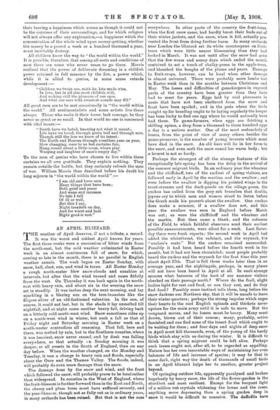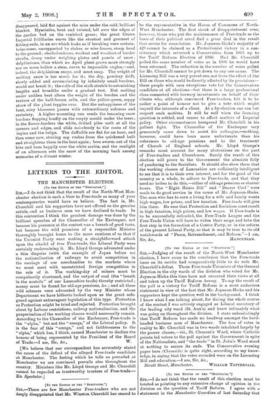AN APRIL BLIZZARD.
THE weather of April deserves, if not a tribute, a record. It was the worst and coldest April known for years. The first three weeks were a succession of bitter winds from the north-east, but the cold weather culminated in Easter week in an almost continuous fall of snow, for which, coming so late in the month, there is no parallel in English weather annals. The week began on Easter Sunday, with snow, hail, sleet, sun, and wind in turns. All Easter Monday a rough north-easter blew snow-clouds and sunshine at intervals, but after that the wind turned and came fitfully from the west. On Thursday it was back again in the north- east with heavy rain, and about six in the evening the snow set in steadily. It was inches deep the next morning, and lay sparkling in a blazing sun on the tree-branches like the filigree silver of an old-fashioned valentine. In the sun, of course, it could not last, but in the shade it lay unmelted till nightfall, and at night came another heavy fall, driving back on a bitterly cold south-west wind. Snow sometimes rides up on a south-west wind in winter, but such a fall as that of Friday night and Saturday morning in Easter week on a south-wester contradicts all reasoning. That fall, here and there, was melted by rain, but in the Southern counties, where it was heaviest, snow never ceased, and by dusk was falling everywhere, so that actually n Sunday morning it was deeper, at all events in the South of England, than on any day before. When the weather changed, on the Monday and Tuesday, it was a change to heavy rain and floods, especially about the Ouse and the Thames Valley. The floods, indeed, will probably do even more damage than the snow.
The damage done by the snow and wind, and the frost which followed the snow, will probably prove to be local rather than widespread. In counties in the West of England, where the fruit-blossom is further forward than in the East and North, the cherry and plum trees must have suffered severely, and the pear-blossom, though not as fully out as in ordinary years, in many orchards has been ruined. But that is not the case
everywhere. In other parts of the country the fruit-trees, when the first snow came, had hardly burst their buds out of their winter jackets, and the snow, when it fell, actually pre- vented the frost from doing further harm. In many orchards near London the blizzard set its white counterpane on fruit- trees which were little nearer blossoming than they had looked in March. II was not until after the snow had gone that the few warm and sunny days which ended the month contrived to set a touch of chalky-green in the apple-trees, and blanched the boughs of the plums and pears. Damage to fruit-crops, however, can be local when other damage is almost universal. There were probably more lambs lost in Easter week than in the months between Christmas and May. The losses and difficulties of gamekeepers in exposed parts of the country have been greater than they have had to meet for years. Eggs laid by wild pheasants in nests that have not been sheltered from the snow and frost have been spoiled ; and in the peris where the birds caught up for breeding ought to be laying regularly the keeper has been lucky to find one egg where he would naturally have had three. To game-farmers, when eggs are fetching a shilling apiece, a drop from a thousand to three hundred eggs a day is a serious matter. One of the most melancholy of losses, from the point of view of many others .besides the game-preserver, is the number of young leverets which must have died in the snow. An old hare will lie in her form in the snow, and even melt the snow round her warm body; but a leveret is not so hardy.
Perhaps the strangest of all the strange features of this exceptionally late spring has been the delay in the arrival of the summer migrant birds. In an ordinary year the wheatear and the chiffehaff, two of the earliest of spring visitors, are followed early in April by the martins and the swallow ; and even before the swallow is dipping his pointed wings in the trout-streams and the duck-ponds on the village green, the cuckoo has called from the greynsh branches that double, joyous cry to which men and women stood to listen before the Greek made his proverb about the swallow. One cuckoo does make a summer, if a swallow does not, and this year the swallow was seen in England before March was out ; so were the chiffchaff and the wheatear and the martin. But then came a blank, and the columns of the Field, to which faithful observers send their earliest possible announcements, were silent for a week. Last Satur- day there were fresh reports ; the second week in April bad added the whitethroat, the redstart, and the wryneck, the " cuckoo's mate." But the cuckoo remained unrecorded. Possibly it had been heard before the fourth week in the month, but it had not been chronicled; most people probably heard the cuckoo and the wryneck for the first time this year about April 27th. That is full three weeks later than in an average year, and the nightingale, perhaps, in many places will not have been beard in .April at all. In such strange seasons what becomes of the host of our summer visitors checked on their passage north ? Where do the frail, slight bodies light for rest and food, or can they rest, and do they find food ? Possibly some instinct tells them, long before the snow darkens our Northern sky, that it will be unsafe to leave their winter quarters; perhaps the strong impulse which urges their hearts to the cool English uplands and thickets never uprises for the main army until it is safe to move. But the vanguard moves, and its losses must be heavy. Many must drown, blown out of their course; many, probably, arrive famished and can find none of the insect food which ought to be waiting for them ; and four days and nights of deep snow in April must kill thousands, even, of the young of the hardy birds which stay with us during the winter. It is difficult to think that a spring migrant could be left alive. Perhaps such losses ought .not, after all, to be regarded as appalling. Nature has her own inscrutable ways of maintaining her even balances of life and increase of species; it may be that in some dark, right way the death of thousands of small birds in an April blizzard helps her to another, greater project beyond.
Of springing outdoor life, apparently paralysed and broken hopelessly by heavy snow, the life of the flower-garden is the sturdiest and most resilient. Except for the buoyant light of a million wet crystals whitening the lawns and the roses, anything more depressing than a spring garden deep in snow it would be difBcult to conceive. The daffodils have disappeared, laid flat against the mire under the cold, brilliant blanket. Hyacinths, bent and twisted, loll over the edges of the garden bed on the vanished grass; the great Crown Imperial fritillaries curve like the stoutest and greenest of fishing-rods, in an arc which looks as if breaking were certain; briar-roses, unsupported by stakes or wire fences, stoop head to the ground; rhododendrons, weakest and woodiest of border shrubs, droop under weighing plates and panels of snow ; delphiniums, than which no April plant grows more strongly nor on more hollow a stem, curve to impossible angles,—and, indeed, the delphinium snaps, and must snap. The weight of melting snow is too much for it; the dry, powdery drift, slowly added and accumulating by infinitely small burdens, would not break it ; the cells of the stalk stretch to astonishing lengths and breadths under a gradual test. But melting under sudden heat alters the weight of the burden and the texture of the half-frozen cells, and the yellow-green, sappy straw of the plant topples over. But the unhappiness of the bent, miry blossoms passes with extraordinary safeness and . certainty. A higher mounting sun sends the lessening snow burdens flopping loudly on the empty mould under the trees ; in the flower-borders the white, drifted piles melt at all the corners and edges, and slide noiselessly to the roots of the lupins and the tulips. The daffodils are flat for an hour, and then some new, striving sap rushes from the quickened bulb and straightens them in the heat again; bees swarm out of the . hive and hum happily over the white ara.bis, and the sunlight of an afternoon sets the snow of the morning back among memories of a distant winter.









































 Previous page
Previous page